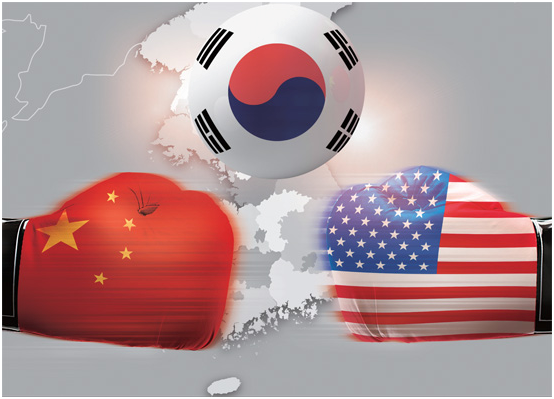
South Korean President Moon Jae-In, who is currently visiting the United States, is scheduled to meet with President Joe Biden in the early hours of Saturday morning Beijing time, and the parties will issue a joint statement. The Voice of America and other media have speculated that the issue of Taiwan will be mentioned, and they say that the strength of the language used by U.S. officials to discuss the issue will be no less than that of a joint statement by the U.S. and Japan.
One can imagine the urgent efforts by the United States to pull Korea into its united front against China, but we also believe that President Moon’s administration will resist American pressure. This is because on the Taiwan issue central to Chinese national interests, giving support to the U.S. does not comport with Korea’s national interests, and amounts to Washington forcing Seoul to drink poison. We have also noticed how ambiguous the statements of American officials are, which reflects how their difficulty in working with President Moon.
Everyone knows that today’s South Korea relies heavily on the U.S. for national security, and, therefore, Washington has leverage in influencing Korean diplomacy. However, China is South Korea’s largest trading partner, and the volume of China-South Korea trade is greater than that of trade between the U.S. and South Korea and between Japan and South Korea combined. Additionally, China is key in deciding issues regarding the Korean Peninsula. It should be noted that, in the past few years, South Korea has generally made efforts to balance Chinese-U.S. relations. Its national influence is weaker than that of Japan, but its diplomatic wisdom is far greater than Japan’s.
As the Biden administration goes to extreme effort in pulling in allies to restrain China, President Moon’s visit to the U.S. will be a new test of South Korea’s diplomatic autonomy. The way the joint statement is written will be the touchstone of whether South Korea can stick to its fundamental principles under U.S. pressure.
The main subject of the U.S.-South Korea summit will definitely concern the Korean Peninsula, but President Biden is certain to be somewhat distracted, as he is now completely focused on China. As South Korea is a nation directly affected by issues on the peninsula, it receives American protection, but it has no way to determine how the U.S. implements this defense. Nowadays, the conflict between the U.S. and North Korea is particularly prominent, and Seoul often has to worry about how to promote peace between the U.S. and North Korea.
The crux of the issue is that the U.S. decided its Korean Peninsula policy based on its own national interests early on, and its consideration of Korean interests has gradually become marginalized. The Biden administration will prioritize the “China factor” in dealing with the Korean Peninsula, which may cause its peninsula policy to deviate from traditional consideration of denuclearization and long-term regional security, while shifting focus to the game between the great national powers.
In short, if it proves difficult to quickly denuclearize the peninsula, the Biden administration will find it more profitable to “Japanify” South Korea on the issue of China. This will focus on both soft power and hard work, and will fashion a strategic trap for South Korea.
South Korea has developed rather quickly in recent years, and this is obviously related to its relatively stable handling of relations with the two major powers of China and the U.S. It has neither over-echoed the U.S. strategy of pressuring China because of its competition with the country as it rises nor has it fully chosen sides in reaching for a phantom goal like the Taiwanese Democratic Progressive Party. The security situation that South Korea faces has always been quite complicated, and it will not be easy to achieve such a relative balance with China and the U.S. South Korea has endured much pressure, but it has also achieved many beneficial things.
In the future, South Korea will probably need to move forward steadily in the complex environment that is the game played by Northeast Asian powers, and refrain from taking extreme measures and sacrificing long-term benefits for short-term gain. Looking at the Indo-Pacific region as a whole, the U.S. has invested most in Northeast Asia. It regards this area as the most important strategic fulcrum for safeguarding its hegemony, as it hopes to mobilize the resources of the entire region to serve its interests. South Korea’s interest lies in interacting creatively with the U.S. superpower, maximizing its influence in shaping the relationship between South Korea and the U.S., and not letting itself be utterly used.

Leave a Reply
You must be logged in to post a comment.